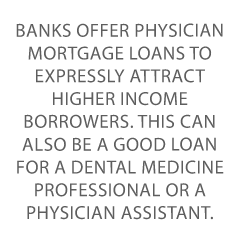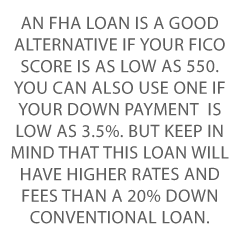Also called a doctor loan, a medical professional can use a physician loan to get what is essentially a mortgage but without a down payment.
Banks offer physician mortgage loans to expressly attract higher-income borrowers. This can also be a good loan for a dental medicine professional or a physician assistant.
What is a Physician Loan?
A physician or doctor mortgage is a special loan program a lender uses to attract high-salaried clients. It allows healthcare professionals such as doctors and dentists to secure a mortgage with fewer restrictions than a conventional mortgage.
When primary care physicians and other medical doctors graduate from medical school, they  can often have no cash or credit. They may not have a job yet. Their debt-to-income ratio can be very bad, due to oppressive tuition (which leads to equally oppressive student loans).
can often have no cash or credit. They may not have a job yet. Their debt-to-income ratio can be very bad, due to oppressive tuition (which leads to equally oppressive student loans).
For any other calling, these people would be considered to be a bad risk. They have all the hallmarks of being incapable of paying their debts. Furthermore, the practice of medicine, dentistry, and veterinary medicine are all high risk industries anyway.
Why would any mortgage lender ever want to take a chance on them?
Of course, the answer is, that they have the potential to bring in very high salaries, despite their high student debt. But since this is a potentiality and not a certainty, many lenders may offer a higher interest rate.
Still, with a doctor loan program, a medical professional can put down less than 20% on a home and avoid having to pay private mortgage insurance (PMI).
Note: some lenders won’t offer a physician’s loan if you’re more than 10 years out of medical school or residency.
How Do They Work?
A physician mortgage loan will work a lot like a conventional mortgage. But such a loan is a lot more accommodating to physicians and their unique circumstances.
Essentially, a doctor can put down less than 20% and still avoid paying for PMI.
PMI is insurance that you pay for to protect a lender against your default. While it is still deductible in 2022, it tends to confer no benefit on the borrower. It ends up being just an expense.
If you have student loans, most of the time, physician mortgage providers will only look at your total required student loan payment, versus your total loan amount owed.
Also, they will generally accept a signed employment contract as proof of income, rather than requiring tax stubs. But independent contractors will often still need two years of tax returns to prove income.
Physician mortgage loans are generally just for owner-occupied properties and not for investment properties. Some lenders will not offer a doctor loan if you are out of medical school for over 10 years.
Other professionals with the potential for high salaries can qualify, like attorneys and accountants.
You can generally borrow up to 90% of $2 million. The interest rate is often 0.125 – .25% higher than for conventional loans. These tend to be adjustable-rate rather than fixed-rate mortgages. This means the interest rate can go up.
With an adjustable-rate mortgage, you often pay a lower, fixed interest rate for the first few years of the loan.
But after that initial period, your interest rate will fluctuate and often increase. Since a borrower may not always be prepared for a higher interest rate, adjustable-rate mortgages carry more risk than fixed-rate mortgages.
You can get them from a national bank like TD Bank or a local lender like Northpointe Bank.
Physician Loan Qualifications
In general, you will need to have a FICO score of over 720. However, if you have 6 – 12 months of proven cash reserves, you may still qualify for a physician mortgage loan.
Often, you will need to have at least a contract for employment in order to qualify. In general, you can close on your loan within 30 – 60 days of starting employment. You may need to prove your salary as well. This means pay stubs or W-2 forms.
Since lenders are familiar with the fact that new doctors may be working in an internship, residency, or fellowship, physician loan lenders will usually accept a contract of employment to verify a doctor’s salary if they do not have pay stubs or W-2s that reflect their current position.
Independent contractors will often need two years of tax returns in order to prove their salary.
If you have student loans, in general, physician mortgage providers will only look at your total required student loan payment, versus your total loan amount owed.
The property must be for your primary residence. You cannot use a physician mortgage loan to finance a second home or an investment property. Often, you cannot use such a loan to finance a condo.
Other high-salaried professionals such as lawyers, certified registered nurse anesthetists, and optometrists can also take advantage of physician mortgage loans.
Loan providers still look at other debt, such as car loans and debt on personal credit cards. But they expect newly-minted doctors to have debts. Hence a higher debt-to-income ratio might be acceptable.
Pros of Physician Loans
With a low down payment (perhaps even nothing) a doctor can avoid paying private mortgage insurance. This also means not having to remember to cancel PMI.
Even with significant student loan debt, a person will still be able to buy a house and build equity. Homeownership is one of the easiest ways to build wealth in the United States. A physician loan makes it possible for a broke medical resident to get started.
In turn, building equity early in life means you have opportunities to take advantage of it if you need it, for repairs or the like down the road. Owning your own home means you can get a fixed rate on your mortgage and not be beholden to how the economy is doing.
When the interest rate goes down again, refinancing means your credit score can go up as your monthly payments go down. This can help with credit approval in the future.
You can get more money, as in up to 90% of $2 million ($1.8 million).
It is possible to close on your house, pay any closing cost, and own it before you’re even employed. Some lenders will require you to have an employment contract in hand. Often, you can close if you’re 30 – 90 days from starting employment.
If you have pay stubs or W-2 forms, you can also use those to show you are earning a salary.
Note: with an adjustable rate, a doctor’s loan might be ideal if you are planning to move quickly. For nurses who expect to do long-term travel for work, getting out of doctor home loans before the rates go up is very possible.
Cons of Physician Loans
With no down payment requirement, you don’t need to have saved (or inherited) enough money for one. Therefore, you won’t necessarily have good savings habits in place. If you’re spending money like water, a physician mortgage loan program will get you deeper into the hole.
If your home loses value, you could end up with an underwater mortgage, where you are stuck with a home loan where the principal is higher than the property is worth. This is where 100 financing (100%) gets dangerous.
In general, you will need to have a credit score of 720 – 740. If your credit score is more like 685, you may still be eligible for physician loans if you have 6 – 12 months of proven cash reserves.
If your credit score is any lower, then you probably won’t qualify for this type of home loan.
A dental professional or the like is already starting life with $200,000 – $300,000 in student loan debt, or more. Adding more debt means a lot of that person’s early salary will go to just paying off debts.
With a physician mortgage loan, you can often buy a bigger house than with a more traditional mortgage from perhaps a national bank. It can be very tempting to allow in-scope creep when shopping for a home. But a small house with furnishings and other amenities is much better than a McMansion with nothing in it.
An adjustable-rate mortgage loan will inevitably go up. If your practice is not doing well, or you aren’t in a very lucrative field (like indigent criminal defense), then you could sink further into debt.
There can be limitations. Regions Bank, for example, only lends in the south and Illinois, Indiana, Iowa, and Missouri.
Alternatives
A physician’s mortgage loan isn’t the only way a high-income professional can finance a home.
FHA Loans
An FHA Loan is a good alternative if your FICO score is as low as 550. You can also use one if your down payment is low as 3.5%. But keep in mind that this loan will have higher rates and fees than a 20% down conventional loan. 
These loans are backed by the government and are insured by the Federal Housing Administration (FHA).
You will have to be a 1.75% Upfront Mortgage Insurance Premium (UMIP) financed on top of the principal loan amount. In addition to UMIP, you’ll also pay a required monthly Mortgage Insurance Premium (MIP) (0.8-0.85% of the loan balance annually) for the life of the loan.
There are lending limits with these loans. Often, they run from about $420,675 to $970,800. As a result, they may not be a good option in some of the less expensive areas of the United States.
They are fixed rates and are especially good if you cannot qualify for other kinds of lending due to a low FICO score.
Rates may be lower than for a physician loan program, but the cost of Private Mortgage Insurance may offset any advantage. If you have student loans, it is harder to qualify, unless you can show that your student loan is in deferral.
Conventional Loans with 20% Down or More
If you have the money for an adequate down payment, there is no reason why you cannot try for a more conventional loan from a more national bank. Often, they have several options, as 30-year or 15-year fixed. Or you can get an adjustable rate.
A loan officer will want to see a lower DTI and pay stubs or W-2s to verify your employment. You may not be able to qualify for a mortgage loan in a conventional loan program until a little later in your medical career.
But you would be able to take advantage of potentially lower rates. And you would have the additional bonus of starting with equity already built in your home.
The biggest downside is having to come up with a significant down payment. And you may very well need to do so while you are still paying rent.
If you are working in an area with lower incomes (such as practicing medicine on a reservation), then it will be more difficult to get such a payment together—particularly if you want to move to a more expensive area.
For high-income professionals who do not mind deferring gratification, this can be an outstanding choice.
Get a Conventional Loan with PMI
If you are not able to come up with a 20% down payment, you can always go the PMI route.
You can make as large a down payment as you are able to and pay for PMI. Any size down payment will help you because it reduces the amount of interest you will ultimately have to pay on your loan. A 3% – 5% down payment is common.
While you will still have to deal with the extra cost that PMI adds to your monthly payment, PMI makes it possible for you to get a mortgage faster at a rate that is lower than what you’d pay with a physician loan.
And you will not have to worry about your interest rate increases with a fixed interest rate. You also won’t have to pay for PMI forever. Once your home reaches 20 – 22% equity, your PMI payments will be canceled. But a savvy medical doctor should check and make sure they are.
A variant of this is the 80/20 loan, where you can borrow 80% at one interest rate and the remaining 20% at a higher interest rate. This option became rarer when the 2018 Global Financial Crisis ended. But it has been making a comeback lately.
Borrow from a Private Banker
If you already have a high net worth, you may already be using private banking. This comes from corporations such as Goldman Sachs, J. P. Morgan, Morgan Stanley, and Merrill (affiliated with Bank of America).
You will need a lot of money—as in $10 million to work with Goldman Sachs! But these organizations often provide more unique ways to save, borrow, and invest.
The savings interest rate may be higher, such as at Goldman, and you would not have to give up the convenience of online banking. Having your own personal banker could be a big plus for high-income professionals.
In addition, given that you will likely have to have more in assets than you could borrow with a physician mortgage loan, private banking can make it easier (or even possible) for you to invest while borrowing—and then pay your mortgage off with your dividends.
In particular, it can be a way to invest in expensive commercial properties, including getting a construction loan to build or improve a property. This is very different from a standard home loan program for any profession, physicians included.
Given the need for high income, you probably won’t qualify right out of medical school. But since doctor loans generally aren’t available if you’re out for more than a decade, you may do well to ‘graduate’ to a private banker.
Home Equity Line of Credit (HELOC)
What, you didn’t know you could use a HELOC to buy another home? Sure you can!
For doctors (and really for people in all industries), using your first home’s equity to buy your second home should be a pretty obvious option.
As long as you meet the requirements of the home equity loan or HELOC lender, you can use any funds you get toward the purchase of another house. But keep in mind, some lenders may regulate the source of your down payment funds when buying a new property.
If you are current on your mortgage loan payments, then you can borrow against your accumulated equity and essentially use your current home as collateral for purchasing a second home.
In practice, what this means is that if you are taking out a doctor’s loan with no money down, it is likely going to be a few years before you will have accumulated enough equity for this to be worth your while.
Specifically, with a HELOC (which is a line of credit and not an actual loan), you can put it toward bigger ticket items, using it much like a credit card. As a result, you can use the money from a HELOC as a down payment on another property for your second home.
Takeaways
A physician loan can be a good choice for professionals within 10 years of graduating. Keep your overall finances in mind and only borrow enough for the home you need, not the biggest place you can get. Since any home you practice out of is also your business, business financing could prove to be an even better choice. Contact us today to explore your financing options.

